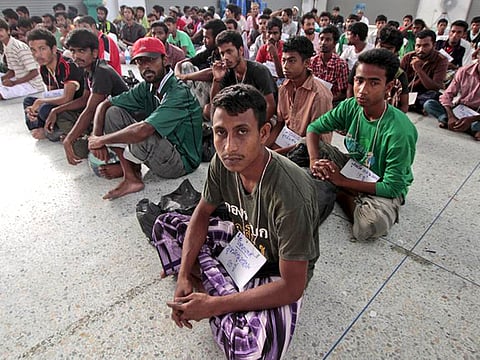In Thailand, migrant workers find common ground
Unregistered migrant workers from Myanmar have started advocacy groups to help others fleeing violence to stand up for their rights

Moe Swe was one of the hundreds of thousands of students who, in 1988, took to the streets of Yangon, Myanmar, hoping to end three decades of military rule. But the military met their protest with guns. The movement was quickly crushed. Many were killed. Others survived but had to flee.
Like so many of his country’s refugees, Moe Swe ran to Thailand, where he began as an unregistered migrant worker in factories and on construction sites. Conditions were poor. He often worked without pay. And with no proper housing, he lived in a shelter that was often targeted by immigration and army officers. To avoid arrest or deportation, he had to bribe officials.
After 10 years, he was fed up. And so, in 1999, Moe Swe set up the Yaung Chi Oo Workers’ Association to fight for the rights of migrant workers like himself. “When there’s a conflict between employers and employees, we tell the workers to negotiate and we try to mediate,” he explains. “If they cannot get the agreement they want, we take them to the professional legal office.”
Of Thailand’s approximately three million migrant workers, an estimated two-thirds are undocumented. The majority come from Myanmar, where a long-running conflict between ethnic minority groups and the military continues to produce refugees. In the border town of Mae Sod, there are nearly 100,000 migrant workers from Myanmar. They are spread across hundreds of factories, working in labour-intensive industries like garment manufacturing. Thailand’s minimum wage is $15 (Dh55.17) a day, but there, workers tell me they are paid much less than that. Registered workers earn $5 a day, and unregistered workers are paid just half that, about $2.50 a day.
Moe Swe says that at first, no one took the Workers’ Association seriously. “The local labour protection and welfare office thinks we’re trouble-makers. But now they understand. Because we also try to mediate between employers and employees,” he explains. The organisation set up safe houses for workers, a day-care centre for their children and a mobile clinic. They filed law suits against several employers, and won compensation for about 200 underpaid workers. Now, it is one of the most respected organisations for migrant workers in Thailand.
But the challenges they face have been evolving too. Thai Prime Minister Prayuth Can-o-cha says he is determined to push unregistered workers back to their country of origin. Harsh new penalties announced in June could mean fines of up to $25,000 for employers, and jail time of up to five years for workers.
On the other side of Mae Sod, I meet Aung Aung, leader of the advocate group Arakan Labour Camp. With the new penalties facing unregistered workers, Aung Aung says their situation is more vulnerable than ever. But he proudly tells me that while ethnic divisions have divided Myanmar for decades, there, workers are uniting across ethnic lines, to fight for their rights. “I have never thought of turning anyone away,” he says. “I help people whether they’re Burmese [Myanmarese] or from any minority group. They come to us because they believe we can help. And if we can’t help, we ask for help from other organisations that can.”
Aung Aung fled fighting in Rakhine state, in western Myanmar, in 2008. In Thailand, he worked for six months in a garment factory — without pay — before seeking help. He says he has a lot to be angry about: His hometown has been stormed by the army time and time again, turning it into a war zone. For a long time, he blamed the Rohingya, Myanmar’s Muslim minority. But in Thailand, living as a migrant worker and fighting for the rights of other workers, his perspective has changed. Against this new threat — having to flee perhaps from the place that they fled to — there’s no room for anger or hatred, Aung Aung says.
“I used to feel angry about what had happened and I really hated them, he says of the Rohingya. “But I learned that anger doesn’t help solve any problems. I told myself to concentrate on the problems at hand, instead of focusing on how I felt.”
— Worldcrunch, in partnership with KBR Calling/New York Times News Service
Kannikar Petchkaew is a journalist based in Thailand.


